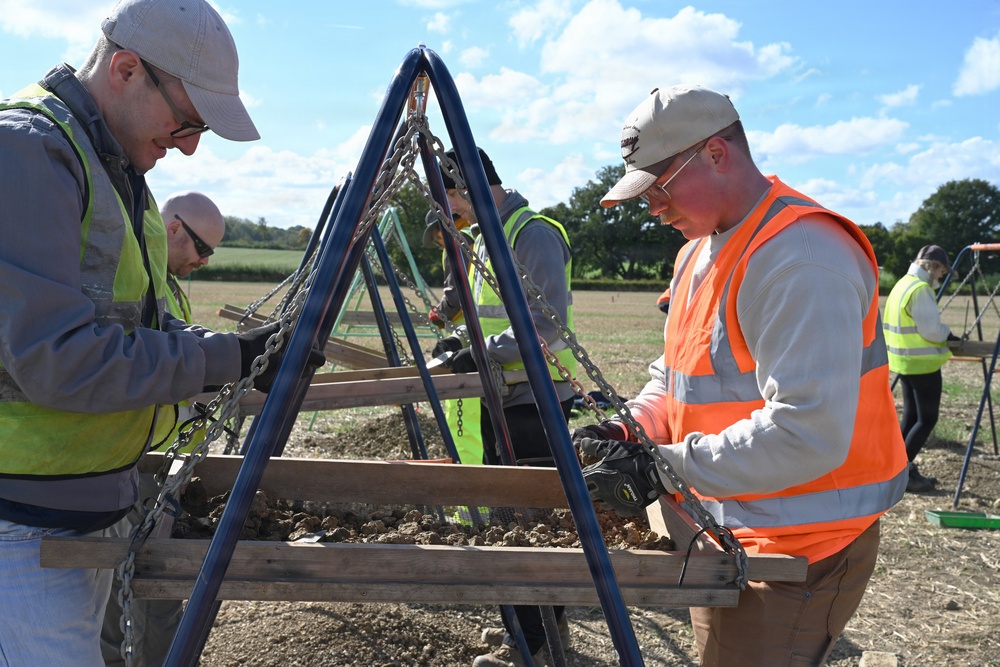DVIDS – News – A Year Later, Maryland Airmen Recall Herculean Effort to Help Afghan Evacuees
A year after Operation Allies Welcome wrapped up, members of the Maryland Air National Guard recalled long hours, sacrifice and a sense of purpose as they helped resettle Afghans fleeing the Taliban takeover of their country.
Lt. Col. Charles B. Wetzelberger is the plans and programs officer at the Maryland Air National Guard Joint Force Headquarters, but from late 2021 into early 2022, he found himself the mayor of 3,000 Afghans living in a temporary village at Joint Base McGuire-Dix-Lakehurst, New Jersey. It was one of three such communities overseen by Task Force Liberty, the military component of the mission there.
According to Wetzelberger, significant effort was put into providing the Afghans with the knowledge and skills they would need in order to successfully adjust to life in the U.S. This included classes in driving, language, banking and U.S. laws as well as domestic skills such as knitting and cooking. Even things that Americans take for granted, such as how to use western toilets – which are very different from those typically found in Afghanistan – had to be explained. “We did classes on everything you can possibly think of, every single day,” he said.
Education was also important for Afghan children. To meet their needs, a primary school was established in the village, which enabled them to both receive an education and also become familiar with how schools in the U.S. typically function. Reflecting the oft-cited double value that members of the reserve components bring to missions, most of the teachers were Coast Guard Reserve members who had backgrounds in education from their civilian jobs.
Coming from a society with very strict delineations of male and female social roles, Afghans also needed to be educated in the norms of behavior expected in America.
“We had two separate entities focusing on the males and the females and making them comfortable with their transition [to American culture],” Wetzelberger said. Afghan men were assigned individual Marines, who performed one-on-one instruction, he explained. A similar team worked with Afghan women, teaching them about topics ranging from social norms in the U.S. to legal rights and protections.
The bottom line was to facilitate their entry into an unfamiliar culture and help them avoid unnecessary difficulties that might arise from being unaccustomed to American laws and behavioral norms. “They wanted to make sure that the Afghanis understand the way that we do stuff in America,” Wetzelberger said, observing that there was “a burning desire to learn” on the part of the Afghans.
While the Airmen assigned to Task Force Liberty were required to maintain professional distance from their guests, Wetzelberger said he was struck by the fundamental kindness and decency he witnessed from both his Airmen and the Afghans.
“To a person, in my village, I have to say, some of the most professional, well-mannered people I have met,” Wetzelberger said, describing the Afghans he encountered. As for the Americans, he summed it up with a story about what happened after learning the clinic had run out of the special formula needed by a premature Afghan baby, which could not consume normal baby formula. After checking every official supply source he could think of and coming up empty, Wetzelberger went to the commissary and purchased some formula designed for premature infants himself. “By the time I got back, my staff had gone out – they’d gone to the local grocery stores – and they bought a case and didn’t want a dime of money back! They went out and bought a case, and it was all kinds of different formula for preemies to make sure that this was what the baby could have…. That was a microcosm of what we were when we were taking care of the Afghanis.”
According to Wetzelberger, what it came down to was a sense of personal obligation and duty he felt towards the Afghans, and which he believes other military members shared.
Although he had previously deployed twice to Afghanistan, Master Sgt. Razak Sidik, a Maryland Air Guardsman who was assigned to Task Force Liberty from October to December 2021, had a much more personal reason for the connection he felt to Operation Allies Welcome. The resettlement mission hit closer to home because his parents had arrived in the United States as refugees nearly 50 years earlier, and he wanted to be able to help others in a similar situation.
“My roots originate from India, but both of my parents were born and raised in Africa. In 1972, when Idi Amin took over Uganda, he ordered expulsion of all Asians, which included my parents’ family,” he said. “An American catholic church sponsored my parents and family to America. So this deployment was my turn to help those who were forced to walk in my parents’ footsteps.”
Sidik’s personal background made him especially valuable in another way: he was fluent in Urdu, one of dialects spoken in Afghanistan. He used his proficiency in Urdu to help communicate with Afghans living at the base. Working the service desk in the command post, Sidik directly assisted in reuniting 52 lost or missing children with their families. He also helped families with living accommodations, addressing security concerns, finding lost items, and coordinating with legal, medical, and federal agencies.
One of his most gratifying moments came when he was able to help the family of an Afghan woman who passed away at the base. Sidik made arrangements that met the requirements of Islamic law, which included the essential steps of washing and shrouding the body through a local funeral home, a funeral prayer by an imam coordinated through the base chaplain and finding a mosque and a Muslim cemetery so the burial could be completed the same day. He also arranged for local agencies to escort the grieving family to the funeral, mosque and cemetery.
While there was a months-long delay as the Department of Homeland Security worked to vet Afghans before relocating them into American communities, by the start of 2022, the rate at which Afghans were cleared to leave the base increased dramatically. From a rate of “a dozen or so” Afghans being relocated each week in 2021, by January 2022 the rate had increased to upwards of 100 per day. The last Afghans left the base on February 17, 2022.
According to Sidik, even though he saw the sadness and loss the Afghans felt, he also saw the freedom, relief and second chance at life that they experienced. Wetzelberger had a similar perspective, describing “a lot of excitement” as Afghans prepared to start their new lives in the U.S.
Although Operation Allies Welcome has concluded and the men, women and children who once made up the population of the Afghan villages at Joint Base McGuire-Dix-Lakehurst and other bases around the U.S. have dispersed to communities across the country, the mission lives on in the memories of the Airmen who made it a success.
“My experiences with the Afghanis that were in the village were pretty special, and I thought that they were amazing people,” Wetzelberger reflected.
| Date Taken: | 04.01.2023 |
| Date Posted: | 04.07.2023 15:16 |
| Story ID: | 442270 |
| Location: | NJ, US |
| Web Views: | 0 |
| Downloads: | 0 |
PUBLIC DOMAIN

This work, A Year Later, Maryland Airmen Recall Herculean Effort to Help Afghan Evacuees, by Col. Wayde Minami, identified by DVIDS, must comply with the restrictions shown on https://www.dvidshub.net/about/copyright.


 Private Internet Access gives you unparalleled access to thousands
of next-gen servers in over 83 countries and each US state. Your
VPN experience will always be fast, smooth, and reliable.
Private Internet Access gives you unparalleled access to thousands
of next-gen servers in over 83 countries and each US state. Your
VPN experience will always be fast, smooth, and reliable.

